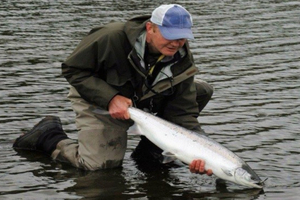Emergency byelaw to protect Severn salmon stocks extended
The Environment Agency is extending an emergency byelaw to protect salmon in the River Severn and its estuary until 15 December.

An emergency byelaw is being extended on the Severn in order to protect salmon stocks
Following a request by the Environment Agency for an extension of the emergency byelaw to protect salmon in the River Severn and its estuary, Parliamentary Under Secretary of State for the Environment, Food and Rural Affairs, Victoria Prentis, has extended the emergency byelaw for 6 months.
The emergency byelaw came into effect last June initially for 12 months. It was introduced after a review of data showed a significant reduction in salmon stock levels in the Severn.
Under the byelaw, draft net and putcher fishing in the Severn estuary is prohibited. Lave net fishing operates on a catch and release basis only. The emergency byelaw also means rod and line fishing is on a catch and release basis only on the whole of the Severn throughout the rod season, which lasts until 7 October.
The move to protect this salmon population came after last year’s figures on the stock levels for the Severn, as well as the Wye and Usk, showed numbers were extremely low. Salmon from the Severn estuary migrate to the Wye and Usk.
Figures this year show salmon numbers remain low, so every fish returned safely could contribute to improving the spawning population this autumn.
Reducing the taking of salmon is only one part of the Environment Agency’s larger national programme to protect salmon stocks. Actions taken by the Environment Agency and its partners that contribute to protecting salmon stocks include removing barriers, improving water quality, implementing better agricultural practices and addressing unsustainable water abstractions.
The Environment Agency is taking these actions because of the need to protect salmon stocks that have declined to unsustainable population levels in many of our rivers. The decline in the numbers of wild salmon, seen not just in English rivers but throughout the North Atlantic, is a major concern and the Environment Agency is determined to protect the future of this important species.
The provisional 2019 declared rod catches on the Rivers Severn, Usk and Wye are the worst on record despite good angling conditions and the removal of all nets operating in the Severn estuary.
David Hudson, Environment Manager for Gloucestershire, said:
We are concerned that the number of returning adult salmon continues to decline despite the current protection measures we have in place. We will closely monitor salmon stocks throughout this year, with a view to introducing more long term protection byelaws if required following consultation, in the hope of increasing the numbers of this iconic species.
Fishing is only one of a number of factors that have led to the fall in salmon stocks in the Severn; environmental factors at critical times in the salmon’s life cycle, such as recent floods and warm winters, also play a part.
We understand the concerns of fishermen, but only by the use of immediate and robust action, with cooperation from others, can we prevent the collapse of salmon stocks in the Severn in the future. Flooding earlier in the year and the coronavirus pandemic has prevented the Environment Agency from carrying out much of its planned engagement with fishermen, but we will look to do that as soon as practical.
Note to editors
- The power to make an emergency byelaw to prohibit the taking of salmon is set out in Schedule 27 to the Water Resources Act 1991 (as inserted by s.225(2) of the Marine and Coastal Access Act 2009).
- Fines for breaking fisheries byelaws are unlimited.
- Current legislation requires all salmon caught before 16 June by rod and line to be returned.
- Legislation already exists to prohibit the sale of any salmon caught by rod and line.
- The average number of salmon caught in the Severn, taken over the last 10 years is 300 salmon caught by 300 fishermen; in 2018, 200 people fished the river, with only 156 fish caught.
- Other countries that have closed salmon net fisheries include, Republic of Ireland, Wales, Scotland, Northern Ireland, and the Faroese fisheries.
- Salmon stocks in the Severn are now classed as “Probably at Risk”
- Reducing exploitation is one action of the ‘Salmon Five Point Approach’ which has been jointly developed and committed to by a wide range of partners including Government, Atlantic Salmon Trust, Angling Trust, River Trusts, Wild Trout Trust, Salmon and Trout Conservation Association and the Institute of Fisheries Management.
- Natural Resources Wales (NRW) has implemented mandatory catch and release byelaws and method restrictions for the 2020 fishing season on all rivers in Wales including the cross border rivers (Dee and Wye). They also implemented an emergency salmon protection byelaw in October 2019 requiring 100% catch and release in the Welsh parts of the River Severn. This byelaw expires in October 2020.
- Putchers are conical baskets traditionally made from natural materials, but more recently from steel. They are fished in ranks, often containing many hundreds of baskets, arranged in up to 3 or 4 tiers and positioned out across the tidal flow. Fish are caught as they fall back on the ebb tide and are trapped, to be retrieved once the rank is exposed at low tide. Some ranks also catch fish on flood tides.
- Lave nets are large triangular hand-held nets that are used by fishermen to intercept and catch individual salmon. Lave net fishing is a rare and specialised form of salmon net fishing and is currently practiced in only two areas of England.
- Draft nets are conventional seine nets fished in a way to encircle and catch salmon by use of a boat and hauling the net into shore.